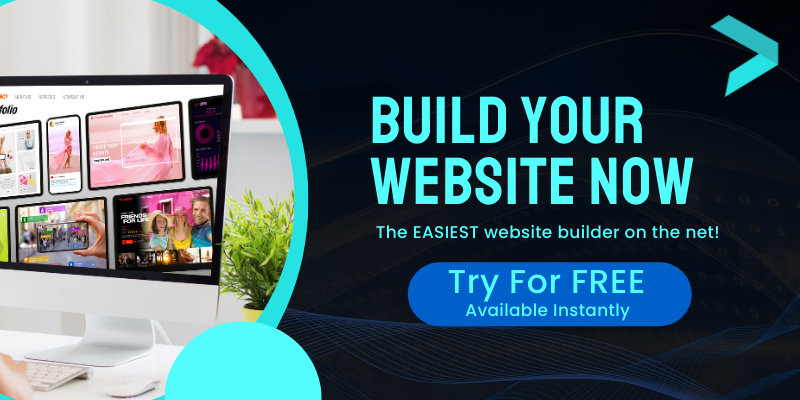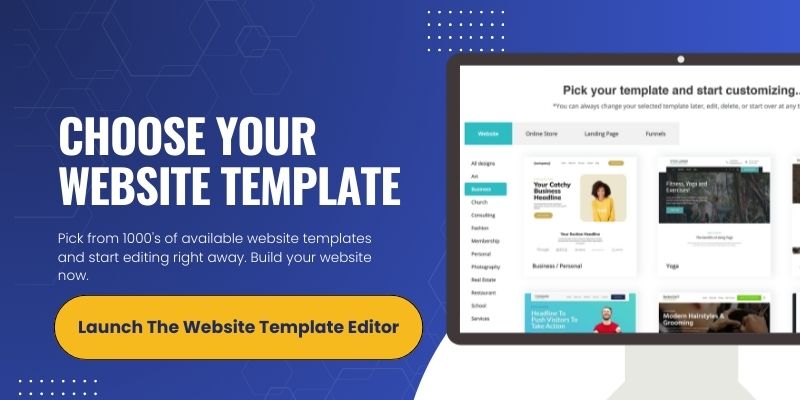Understanding Website Builders
What They Are
Website builders are user-friendly tools that allow anyone to create and manage their own website without needing extensive technical skills. Personally, starting with a website builder made all the difference for me—it’s like having a toolbox that’s organized and easy to use!
These platforms usually provide drag-and-drop interfaces, which means you can just choose your design elements and place them where you want. It’s as simple as moving furniture in your home, but with pixels instead of couches. This kind of flexibility is key, especially when you’re just starting out.
So, if you’re thinking, “Hey, I want a website but I don’t know where to start!” trust me, a website builder is a fantastic first step. You get to see results quickly and start playing around with your online presence right away.
Who Uses Them?
You might be surprised at the variety of folks who use website builders. From small business owners to bloggers, and even large organizations, these platforms cater to a widespread audience. Personally, I’ve seen friends who manage bakeries or local shops use these tools to set up their websites without the hefty price tag of hiring a developer.
Freelancers also find website builders super handy. They allow you to showcase portfolios, making it easy to attract potential clients. Plus, if you’re a content creator, having a personalized space to share your videos or articles is just priceless!
And let’s not forget about non-profits. Many of them rely on website builders to spread their messages, raise awareness, and enhance donations. It’s a game changer for organizations with limited budgets.
The Benefits
One of the biggest perks is cost savings. Hiring a web designer can be pricey, but website builders often have affordable monthly plans. Honestly, I saved so much when I used one initially, which I then invested into better content and marketing!
Another marvelous benefit is speed. I’ve built websites in just a few hours—what used to take weeks can now be tackled over a weekend! This means you can launch your project sooner and start engaging with your audience.
Finally, the flexibility is unbeatable. I can make changes in real-time, trying different designs without the fear of breaking something. It’s like having a digital canvas where I can express my creativity without limits!
Key Features of Top Platforms
User Interface and Experience
The user interface is crucial. I remember trying out a few platforms and getting overwhelmed by complicated menus. A smooth, intuitive design helps you focus on creating rather than figuring out the software.
Many of the best tools offer templates tailored to various industries, which means you can jumpstart your website based on what others have done. These pre-designed layouts allow you to look professional with minimal effort!
Being able to preview your changes live has always excited me. It’s like watching magic unfold right before your eyes, ensuring you’re making the right decisions on the fly.
Customization Options
Customization is where the fun truly begins. It’s important that a platform doesn’t box you in with rigid templates. I love platforms that allow extensive customization—colors, fonts, layouts, all of it! You need to express your unique personality.
Some platforms even let you add personal code snippets for those who want to go that extra mile. I like to tinker here and there, incorporating little bits of custom CSS to make my site uniquely mine.
This level of freedom in customization means you can stand out in a crowded online space, helping you attract your audience without blending in with the crowd.
SEO and Marketing Tools
SEO (Search Engine Optimization) is a must-have for anyone looking to succeed online. Platforms that come with built-in SEO tools make it so much easier to optimize content. In my experience, these tools have helped my websites rank higher in search results, leading to increased traffic.
It’s equally important to have marketing integrations. Remember the first time I was able to connect my social media accounts and email marketing tools directly? It saved me so much time and kept my branding consistent across the board.
Having these features readily available takes some of the stress out of growing your online presence. It allows you to focus more on the content, refining your voice, and connecting with your audience.
Popular Website Builders
Wix
Wix was my first major website builder, and let me tell you, I can’t recommend it enough! With its drag-and-drop functionality, it’s incredibly user-friendly. I remember being blown away by how easy it was to create a stunning website just by dragging elements around.
The template selection is vast, covering everything from portfolios to business sites. Plus, their support team is super helpful for beginners. They understand that building a website can be daunting, and they’re there to ease that journey.
The number of apps you can integrate is staggering. Whether you need e-commerce features or booking capabilities, there’s likely an app for that. Flexibility is the name of the game here!
Squarespace
Next on my list is Squarespace. This platform is known for its gorgeous templates, which really draw you in. It feels like having professional designers at your fingertips! When I wanted my photography website to look sleek and modern, Squarespace delivered.
The attention to detail in design is something I admire, and it’s perfect for creative individuals. The simplicity of managing your site, combined with the impressive visuals, can attract and retain visitors effectively.
One downside for some might be that it’s less flexible in customization compared to others. However, for pure aesthetics, it’s hard to beat Squarespace!
WordPress.com
Finally, there’s WordPress.com, which powers a significant chunk of the web. While it can be a tad overwhelming for newbies, it offers unparalleled flexibility. It’s great if you want more power and scalability over time.
The wide array of plugins available is another huge plus. I’ve been able to add functionalities ranging from SEO tools to social media sharing buttons without breaking a sweat. This adaptability is unmatched!
However, I do recommend some prior knowledge or willingness to learn the ropes, as the learning curve is steeper than with some drag-and-drop competitors. Once you get over that hump, though, you’ll find it a rewarding experience!
Choosing the Right Platform for You
Assessing Your Needs
Before diving into a platform, it’s essential to understand what you need. Are you looking for something simple to get started, or do you need robust features for a growing business? I always find it helpful to jot down my requirements before making a choice.
When I first started, simplicity was key. I didn’t have the time or knowledge to delve into complex settings. But as my needs evolved, I was able to adapt and migrate to more feature-rich platforms without hassle.
Identifying your priorities guides you through the selection process. Think about your audience, your goals, and how much time you can dedicate to website management.
Exploring Trial Versions
Most platforms offer trial versions—don’t skip this! I learned the hard way that what looks good on paper doesn’t always translate to user friendliness. Testing different platforms helped me settle into one that truly fit like a glove.
During these trials, play around with various templates and features. Create an imaginary site and see how easy—or hard—it is to use. An enjoyable experience will keep you motivated to keep building and creating.
This exploration phase is super vital to ensure you find a platform that feels just right to you, eliminating future headaches down the line!
Seeking Recommendations
It never hurts to ask around! Friends, family, or online communities can provide valuable insights. Personally, I was introduced to one of my favorite platforms by a friend who vouched for its fantastic customer service and ease of use.
Check out online reviews and forum discussions too. Hearing from actual users can give you a clearer picture of a platform’s strengths and weaknesses. It’s like crowdsourcing knowledge before diving in!
Once you gather all this information, you’ll be better equipped to make a savvy choice, leading you closer to crafting the website of your dreams.
FAQ
1. What is a website builder?
A website builder is a platform that allows you to create a website easily without needing deep technical skills, typically featuring a drag-and-drop interface and customizable templates.
2. Who can benefit from using a website builder?
Essentially, anyone! Small business owners, freelancers, bloggers, and non-profits can all take advantage of the simplicity and affordability that these platforms offer.
3. How do I choose the right website builder?
Consider your needs, explore trial versions, and seek recommendations from experienced users to navigate the best options fitting your requirements.
4. Are there any costs involved when using website builders?
Yes, while many website builders have free versions, most offer paid plans that unlock additional features, templates, and support.
5. Can I customize my website built on a website builder?
Absolutely! Most platforms offer various customization options, allowing you to tailor your website to reflect your brand or personal style.

